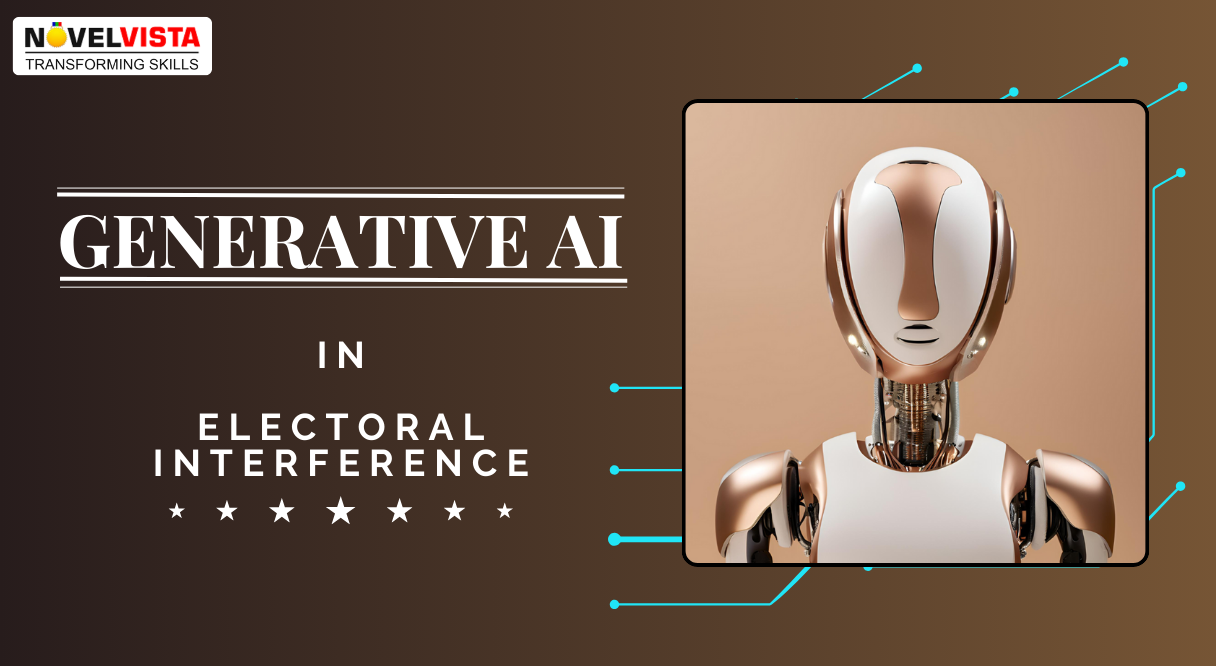Enroll Now and Get Upto 30% Off
* Your personal details are for internal use only and will remain confidential.

Last updated 23/10/2024

Misinformation has become a big threat to global elections in this advancing era of technology, making it more difficult for people to trust what they see and hear. With the rise of social media, incorrect information spreads very fast, impacting how people think and act.
Imagine watching a video of a candidate saying something weird only to discover later that it was entirely fabricated! The role of Generative AI in electoral interference can be a major cause of this situation. It's a strong technology that can generate lifelike images, movies, and text that appear authentic but are fake.
As we approach the next election, we must remain informed and think critically about the information we encounter. How do you believe we can improve our ability to identify misinformation?
Electoral interference refers to efforts by external or internal factors to influence the outcome or fairness of an election. These efforts can undermine the integrity of the electoral process, affecting trust in democratic systems.
Historically, electoral involvement has taken many forms. This ranges from propaganda efforts that alter public opinion to the transmission of fake news intended to mislead voters.
Governments and organizations have traditionally manipulated information via print publications, radio broadcasts, and, more recently, social media platforms.
These strategies involved developing narratives that favored specific candidates or ideas most of the time, resulting in a fog of misinformation that voters struggled to pass.
Generative AI is a game changer that raises the bar for misinformation. AI can generate hyper-realistic films and indistinguishable articles from authentic sources using technologies such as deepfakes and automated content generation.
This means that misinformation can spread more quickly and appear more legitimate than ever before. Imagine scrolling through your page and coming across a convincing video of a candidate making harsh remarks, only to discover later that it was completely manufactured.
The speed and credibility of AI-generated content provide substantial hurdles for voters attempting to differentiate fact from fiction in an increasingly complicated information ecosystem. The role of Generative AI in electoral interference has become increasingly concerning in recent years. As political campaigns become more digitized, the role of Generative AI in electoral interference grows, allowing the creation of hyper-realistic deepfakes, fake news, and manipulative content.
The role of Generative AI in electoral interference involves the use of artificial intelligence to influence, manipulate, or disrupt elections. Here are some key examples:
What do we understand by deepfakes? Deepfakes are incredibly realistic AI-generated audio and video recordings that might mislead voters by making candidates appear to have said or done things they did not.
A significant case occurred during a political campaign when a deepfake of President Biden was deployed in robocalls to reduce voter turnout. This strategy has been used across the political spectrum, with candidates utilizing deepfakes to alter perceptions and tarnish opponents' reputations.
AI technology, especially Large Language Models, allows for the mass fabrication of fake news stories and social media material. These techniques can generate seemingly believable tales that impact public opinion and quickly propagate misinformation.
The ease with which such content can be created makes discriminating between true and fake news difficult, affecting attempts to safeguard electoral integrity.
For example, researchers have observed an increase in AI-generated graphics and articles, which are now nearly as common as traditional misleading approaches, making it increasingly difficult for voters to detect the truth.
Increased Confusion - AI-generated misinformation can produce contradicting narratives, making it harder for voters to distinguish between fact and fiction.
Skepticism Toward Institutions - Voters' frequent exposure to fake information causes them to doubt the legitimacy of electoral procedures and institutions.
Undermining Authority - Misinformation can discredit election officials and reputable sources, creating a culture of uncertainty about election results.
Voter Disengagement - As trust deteriorates, some voters may become disillusioned and choose not to vote, believing their votes are meaningless.
Deepening Political Divides - AI-generated propaganda frequently targets specific political groups, reinforcing preexisting biases and creating echo chambers.
Amplifying Extremist Views - Misinformation can amplify radical views, pushing moderate voices to the sidelines and fostering polarization.
Fragmented Societal Cohesion - Social cohesion deteriorates as societies grow ideologically fragmented, resulting in greater tensions and conflicts.
Diminished Public Discourse - Misinformation undermines healthy dialogue, making it difficult for individuals to engage in meaningful debates across party lines.
Artificial intelligence is not only a source of misinformation, but it also plays an important role in countering it. Several tools have arisen to detect and neutralize fake content.
Fact-Checking Algorithms - Tools such as ClaimBuster and Full Fact use artificial intelligence to scan vast amounts of text for possibly erroneous statements and flag them for additional study. These technologies integrate natural language processing with machine learning to improve accuracy in detecting disinformation.
Automated Verification Tools - Tools like Factinsect and Wisecube compare content to reliable sources, allowing for fast credibility judgments. They use a traffic light system—green for verified facts, red for misleading claims, and gray for unclear data—so that consumers can quickly assess the reliability of content.
Browser Extensions - Tools like NewsGuard and BotSlayer assist users in determining the integrity of news sources and detecting deceptive social media behaviors, respectively. These additions seek to provide real-time feedback on the reliability of material seen online.
As AI-generated misinformation spreads, technology platforms and governments must take proactive measures:
Platform Accountability - Popular social media platforms such as Facebook and Google are increasingly working with independent fact-checkers to combat the spread of incorrect information. Third-party verification programs help to ensure that erroneous content is reported before it reaches a larger audience.
Regulatory Frameworks - Governments are encouraged to develop explicit policies governing the use of AI in political contexts. This includes transparency rules for AI-generated content as well as sanctions for purposefully sharing misleading information. Such measures can help to ensure voting integrity while also increasing public trust in democratic processes.
Incorporating AI into political campaigns creates a complicated network of ethical problems, in which the need for innovation must be balanced against the risk of misuse.
While AI can improve voter involvement and communication, it also has the potential to enable misleading tactics that compromise democratic legitimacy.
Developers, social media corporations, and political institutions all have a collaborative obligation to ensure that generative AI is utilized ethically, with controls in place to prevent harmful applications.
This accountability is important for fostering confidence and maintaining the integrity of political processes, as well as ensuring that technology is used to empower rather than manipulate people.
Foreign countries, such as Russia and Iran, used AI to spread misinformation during the 2020 US presidential election, using deepfakes and deceptive content directed at candidates.
A significant example featured AI-generated robocalls impersonating President Biden to decrease voter turnout. Intelligence officials reported that AI-enabled faster and more convincing manipulation of information, raising concerns about its influence on public trust.
During Brexit, misinformation operations in the United Kingdom used artificial intelligence to magnify controversial content and mislead voters.
Brazil encountered similar issues during its elections, with AI-generated content exploited to disseminate misleading narratives about candidates and voting procedures.
In India, political parties have used AI techniques to generate targeted misinformation, impacting voter opinions in a highly polarized environment.
To protect election processes from AI-driven misinformation, it is important to improve cybersecurity protections and establish comprehensive fact-checking systems capable of detecting bogus content rapidly.
Collaborating with tech companies to develop transparent criteria for AI use in campaigns would also help to retain integrity. Additionally, public education is critical; voters should be trained to spot false AI-generated content through seminars and online tools.
This awareness will provide them the ability to critically examine information, allowing them to make educated voting selections.
The role of Generative AI in electoral interference is a major issue. As we face the challenges of the AI era, preemptive initiatives to prevent AI-driven misinformation are critical to ensuring democracy.
We can build a strong framework that preserves future elections' integrity by strengthening electoral processes, improving public education, and encouraging collaboration among digital companies, governments, and civil society. Governments and regulatory bodies are now grappling with how to address the role of Generative AI in electoral interference to ensure fair and trustworthy elections.
Let us work together to empower voters to tell the difference between truth and deception, ensuring that our democratic processes are fair and trustworthy. The path ahead may be difficult, but with collective effort, we can ensure a brighter future for our democracy!
Topic Related PostNovelVista Learning Solutions is a professionally managed training organization with specialization in certification courses. The core management team consists of highly qualified professionals with vast industry experience. NovelVista is an Accredited Training Organization (ATO) to conduct all levels of ITIL Courses. We also conduct training on DevOps, AWS Solution Architect associate, Prince2, MSP, CSM, Cloud Computing, Apache Hadoop, Six Sigma, ISO 20000/27000 & Agile Methodologies.
* Your personal details are for internal use only and will remain confidential.